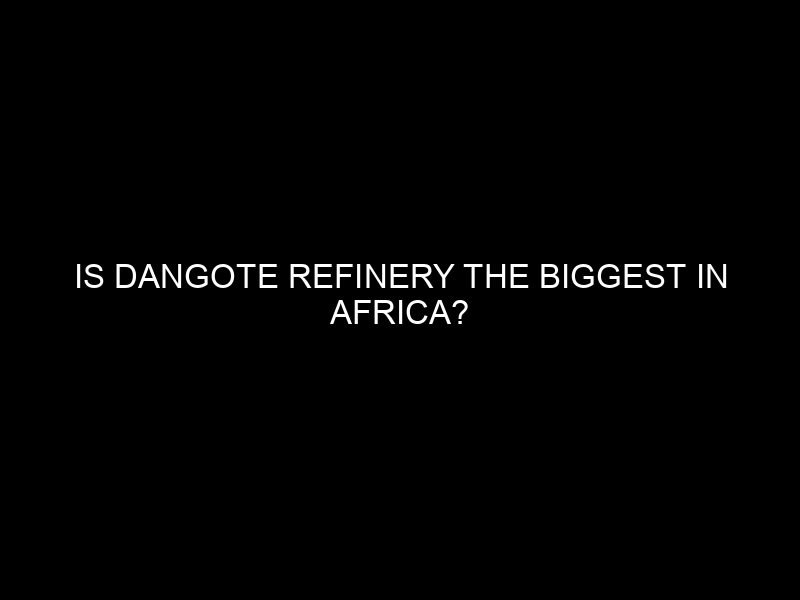As an expert with a background in Nigerian business and intimate knowledge of the Dangote Group, I am uniquely positioned to shed light on the Dangote Refinery, a project that has captured the attention of industry experts, economists, and environmentalists worldwide. The question of whether the Dangote Refinery is the biggest in Africa is not just about its physical size, but also about its economic, environmental, and geopolitical implications. In this article, we will explore various facets of the Dangote Refinery, delving into its scale, capabilities, and the transformative potential it holds for Nigeria and the African continent at large.
The Scale of Dangote Refinery
The Dangote Refinery at a Glance
Located in Lagos, Nigeria, the Dangote Refinery is a flagship project of the Dangote Group, spearheaded by Aliko Dangote, Africa’s richest man. This refinery is not just a business venture; it represents a strategic pivot in Africa’s economic narrative. With a planned capacity to process 650,000 barrels of crude oil per day, the refinery is poised to be the largest single-train refinery in the world.
Comparing with Other African Refineries
When compared to other refineries in Africa, the Dangote Refinery stands out not only in terms of capacity but also in terms of technology and environmental considerations. For instance, the Skikda Refinery in Algeria, currently one of the largest in Africa, has a capacity of 335,000 barrels per day, almost half of what Dangote Refinery promises.
Economic and Geopolitical Implications
Reducing Dependency on Imported Fuel
Nigeria, despite being one of the largest producers of crude oil in the world, has been heavily reliant on importing refined petroleum products. The Dangote Refinery is expected to change this narrative, transforming Nigeria from a fuel importer to a net exporter. This shift is not only economically significant but also holds profound geopolitical implications, potentially altering the balance of trade in the region.
Job Creation and Economic Growth
The refinery is set to create thousands of direct and indirect jobs, driving economic growth in Nigeria and across the continent. Its operation will stimulate related industries, including petrochemicals and agriculture, thereby diversifying Nigeria’s oil-dependent economy.
Environmental Considerations
Adopting Cleaner Technologies
One of the critical aspects of the Dangote Refinery is its commitment to environmental sustainability. The refinery is designed to operate with a high degree of efficiency and minimal environmental impact. This approach is in line with global trends towards cleaner energy and sustainable practices in the oil and gas sector.
Challenges and Controversies
Navigating Local and Global Challenges
Despite its potential, the Dangote Refinery faces a range of challenges. From logistical hurdles in construction to concerns about the environmental impact of refining operations, the project is not without its critics. Additionally, fluctuating global oil prices and the shift towards renewable energy sources pose significant risks to the refinery’s long-term viability.
The Future of Dangote Refinery and Africa’s Oil Industry
A Catalyst for Change?
The Dangote Refinery could be a catalyst for broader changes in Africa’s oil industry. By demonstrating the feasibility of large-scale, efficient, and environmentally conscious refining operations, it could pave the way for similar projects across the continent.
The Role of Innovation and Sustainability
As we move forward, the key to the success of the Dangote Refinery and the African oil industry will lie in innovation and sustainability. Embracing new technologies, adhering to environmental standards, and adapting to the changing energy landscape will be crucial.
FAQs
Q: When is the Dangote Refinery expected to begin operations? A: The Dangote Refinery is expected to begin operations in 2024, although this timeline may be subject to change based on various factors.
Q: How will the Dangote Refinery impact Nigeria’s economy? A: The refinery is expected to have a significant positive impact on Nigeria’s economy by reducing fuel imports, increasing exports, creating jobs, and stimulating related industries.
Q: What measures are being taken to ensure the refinery’s operations are environmentally sustainable? A: The Dangote Refinery is designed with state-of-the-art technology to maximize efficiency and minimize environmental impact, including measures to reduce emissions and manage waste effectively.
Conclusion
In conclusion, the Dangote Refinery is not only set to be the biggest in Africa in terms of capacity but also stands as a beacon of industrial, economic, and environmental progress for the continent. Its completion will mark a significant milestone in Africa’s journey towards self-sufficiency and sustainable development in the oil and gas sector. As we watch this mega-project unfold, its ripple effects on the regional and global stage will undoubtedly be a subject of keen

Leave a Reply